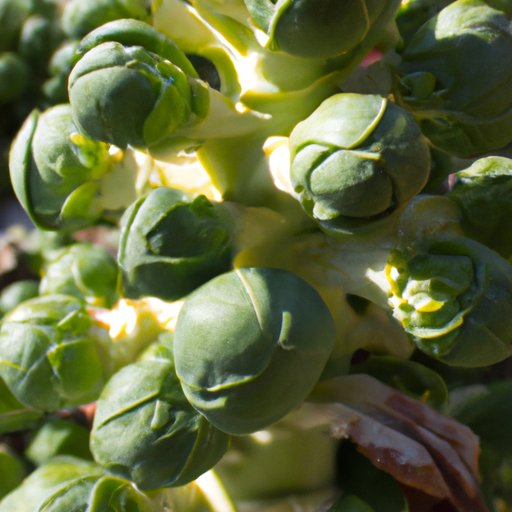
Introduction
Brussels sprouts are a nutritious and delicious vegetable that can be a great addition to any home garden. Not only do they offer impressive health benefits, they are also known for their unique flavor and versatility. In this article, we will cover the fundamentals of growing Brussels sprouts, including what you need to know to plant, care for, and harvest these delicious vegetables.
The Basics
Brussels sprouts are a type of cabbage that are typically smaller in size and grow on tall stalks. They are loaded with nutrients, including vitamin C, vitamin K, and fiber. To grow Brussels sprouts, you’ll need to start with good quality seeds or seedlings, rich soil with plenty of organic matter, and the right growing conditions. Brussels sprouts are typically planted in the late summer or early fall months, and they require a good deal of space to grow to their full potential.
Benefits of Growing Brussels Sprouts
There are many reasons why you might want to consider growing your own Brussels sprouts. For starters, these veggies can be quite expensive to purchase from the store, especially if you prefer organic produce. Growing your own Brussels sprouts can help you save money while also ensuring that you have a fresh supply on hand whenever you need it. Additionally, many people find that homegrown Brussels sprouts taste much better than store-bought varieties. Finally, growing your own Brussels sprouts can offer a range of health benefits, including improved digestion and a boosted immune system.
Planting Requirements
Before you start planting your Brussels sprouts, it’s important to choose the right location for your garden. Brussels sprouts thrive in cool, moist environments, so you’ll want to choose a spot that is shaded or partially shaded and gets plenty of morning sun. You’ll also want to make sure that your soil is rich in organic matter and has a good balance of nutrients. Brussels sprouts are typically planted in the late summer or early fall, with the seeds sown about 1/2 inch deep and 3 inches apart. Once your plants start to grow, you’ll want to thin them out so that they have plenty of space to grow.
Growing Tips
To ensure that your Brussels sprouts stay healthy and productive, there are a few key things you’ll want to keep in mind. First, it’s important to water your plants regularly, especially during dry spells. You can also help to keep the soil moist by mulching around the base of your plants. Additionally, you may want to consider companion planting with plants like onions, garlic, and chives, which can help to keep pests at bay. Finally, keep an eye out for common pests and problems that may affect your Brussels sprouts, such as aphids, moths, and caterpillars, which can be treated with insecticidal soap or other organic remedies if needed.
Harvesting and Storage
Brussels sprouts typically take around 3-5 months to mature, depending on the variety you’ve chosen, and you’ll want to wait until the sprouts are about 1-2 inches in diameter before harvesting. To harvest, simply cut the sprouts off of the plant with a sharp knife or pruners. After harvesting, you can store your Brussels sprouts in a plastic bag in the refrigerator for up to a week, or you can blanch and freeze them for longer storage.
Recipe Suggestions
Brussels sprouts can be enjoyed in a wide range of dishes, from roasted sprouts with balsamic vinegar to stir-fries, salads, and more. Here are a few recipe suggestions to get you started:
- Roasted Brussels Sprouts with Garlic and Parmesan
- Brussels Sprouts and Bacon Stir-Fry
- Maple Roasted Brussels Sprouts
- Brussels Sprouts Salad with Lemon Vinaigrette
Helpful Resources
If you’re new to gardening or just need more information on growing Brussels sprouts, there are plenty of resources available to help you along the way. Local gardening clubs can be a great source of information and support, and there are also many online resources, such as video tutorials and gardening blogs, that can offer additional tips and tricks.
Conclusion
Growing Brussels sprouts can be a fun and rewarding experience that offers numerous health and financial benefits. By following these tips and suggestions, you can grow healthy, delicious Brussels sprouts right in your own backyard.




